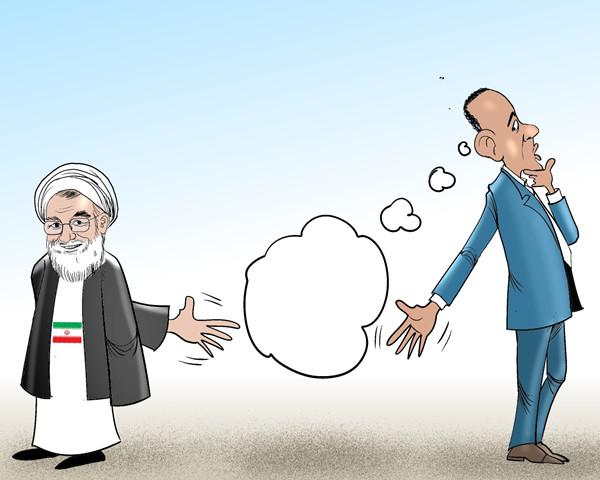Try serious diplomacy with Iran
- By Zhao Jinglun
 0 Comment(s)
0 Comment(s) Print
Print E-mail China.org.cn, September 29, 2013
E-mail China.org.cn, September 29, 2013
Barack Obama got his response to Iran's peace offer "half right," in the words of Leslie Gelb of the Council on Foreign Relations. Obama said a "meaningful agreement" between the arch rivals is possible and added "I firmly believe the diplomatic path must be tested." He instructed U.S. Secretary of State John Kerry to pursue diplomatic efforts with the Iranian government in close coordination with the European Union, the United Kingdom, France, Germany, Russia and China. Trita Parsi, head of the National Iranian American Council, called it "very good news." Iran's President Hassan Rouhani also called for "time-bound and result-oriented talks" in his UN speech, and added that he hopes it will take months, not years, to reach an agreement.
|
|
|
Half-accepting [By Jiao Haiyang/China.org.cn] |
But Obama also warned that mistrust between the United States and Iran has "deep roots," and reaffirmed that thwarting Iran's "pursuit of nuclear weapons" would remain a U.S. foreign policy priority. He clearly does not believe that the history of difficult relations between the two countries can be overcome overnight.
As a symbolic gesture, however, Obama made the first official American acknowledgement of the CIA's role in overthrowing the democratically elected government of Mohammad Mosadegh in 1953. Following the coup, the U.S. installed Shah Mohammed Reza Pahlavi and supported his harsh dictatorial rule until the Islamic revolution of 1979 and the taking of U.S. diplomats as hostages.
To attempt serious diplomacy and work out a meaningful compromise will not be easy. Right-wing war hawks are already out in force to preempt talks and guarantee their failure. They include U.S. neoconservatives, the Israelis and their supporters, and the Gulf States, especially the Saudis, who have repeatedly called on Washington to "cut off the snake's head."
The positions of the two sides are far apart. The United States and Israel have so far been unwilling to live with an Iran that has access to the full nuclear fuel cycle, while Iran is unwilling to give up its right to enrich uranium for peaceful purposes. Western governments have demanded that Iran suspend its uranium enrichment program and negotiate an agreement to relinquish it entirely, in exchange for a package of economic incentives. But Iran says it is pursuing enrichment for peaceful purposes only, and insists that this is its right under the Nuclear Non-proliferation Treaty.
Even John Kerry, back in June 2009 when he was chair of the Senate Foreign Relations Committee, said it was "ridiculous" to make Tehran surrender that right as a pre-condition for a diplomatic solution. "They have a right to peaceful nuclear power and to enrich in that purpose," Kerry told the Financial Times.
In a bid to break the stalemate, Iran has proposed strengthening the international inspection regime. But the West insists that Iran forgo uranium enrichment and instead agree to import its reactor fuel.
U.S.-backed Europeans have proposed a "freeze for freeze" formula under which Iran would agree not to expand its enrichment capacity in exchange for the Western powers agreeing not to impose new sanctions - in particular a ban on the import of refined gasoline - which rightist war hawks have been vociferously demanding.
All sorts of plans have been devised, including one for the creation of an international fuel bank proposed by the Center for Strategic and International Studies.
But hardly anyone is asking the fundamental question: Why is Israel allowed to hold a huge nuclear arsenal without signing the Non-Proliferation Treaty, while Iran is not even allowed to enrich uranium for peaceful purposes?
In the August 21, 2004 edition of the International Herald Tribune, the Israeli military historian Martin van Creveld wrote that, given the serious military threat from the United States and Israel, "had the Iranians not tried to build nuclear weapons, they would be crazy."
Ayatollah Khamenei, Iran's supreme leader, and its new President Hassan Rouhani, are not crazy. They have both declared they will never seek nuclear weapons. Barack Obama should seize what may be the last chance to reach a compromise with the Islamic state of Iran.
The author is a columnist with China.org.cn. For more information please visit:
http://www.china.org.cn/opinion/zhaojinglun.htm
Opinion articles reflect the views of their authors, not necessarily those of China.org.cn.







Go to Forum >>0 Comment(s)